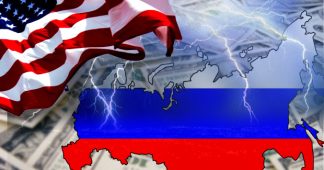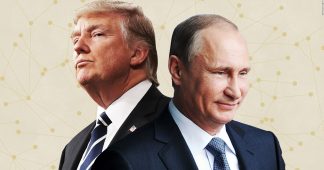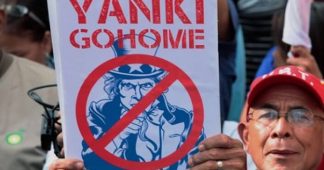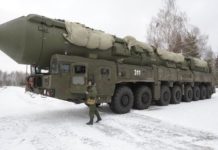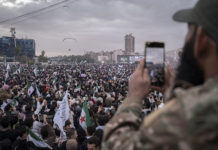The growth of authoritarian solutions in Washington and Brussels in response to self-induced political and economic decline has led to the imposition of sanctions and the adoption of military responses. The regimes have taken over the major media and turned them into mega-phones for violent power grabs and self-defeating restrictions of trade.
Washington’s belligerency is beating empty oil drums for US oil giants. Overt hostility prepares for trade wars, military confrontations and regional conflagrations . . . which the US and EU will lose.
Economic warfare is designed to impoverish nations and create a pretext for fomenting internal discord, by financing electoral collaborators, street mobs and military vassals.
Washington, hampered by internal divisions, stumbles backward toward major catastrophes. Oligarch’s in Brussels face multiple divisions and open rebellion.
Brexit is a rebellion against decades long, deepening inequalities and the financial power grab.
Central and Eastern European authoritarians challenge the Brussels oligarchy. Powerful national bosses in Poland, Hungary and Slovakia embrace Israeli warlord Netanyahu in a common quest to weaken Brussels.
The break-up of internal cohesion, in Washington and Europe, has led to efforts to externalize warfare, in order to retain state power – a kind of building capitalism for a few countries.
In summary the break-up of the US-EU bloc has led to reliance and dependence on economic warfare, sanctions, boycotts, and tariff walls with competitors and rivals.
Washington and Brussels have targeted four major countries: Russia, China, Iran and Venezuela. Economic warfare is preceded by media demonization and is accompanied by the recruitment of regional clients in order to buttress economic sanctions. Economic and ideological warfare is designed to provoke internal political divisions in the lead-up to a seizure of political power.
Russia: Economic Sanctions and Peripheral Wars
Washington and the European Union have pursued a dual strategy against Russia. On the one hand they have militarily encircled Russia by land, sea and air, from the Baltics to the Ukraine. On the other hand they have imposed trade sanctions on Russian imports and exports of military and civilian technology, petroleum companies, machine goods, agriculture and other commodities. The strategic goal is to pressure the Russian people to overthrow the Putin presidency and restore a vassal regime which will allow the West to pillage the country’s resources and wealth, as it did during the 1990’s.
The sanctions and military strategy have generally boomeranged, with the possible exception of the Western organized coup in the Ukraine. Economic sanctions have led Russia to reindustrialize and diversify its production to substitute local production and increase agricultural self-sufficiency.
Russia has increased its linkages to China and Iran, while retaliating by cutting off agricultural exports from Poland and Georgia. Western efforts to encircle Russia have led Moscow to incorporate Crimea and expand its links with Syria. Moreover the sanctions policy has been violated by oil and gas and oil importers from Germany, Italy and other countries.
The Ukraine power grab has led to a corrupt, decadent regime surviving on Western handouts.
The resort to propaganda ploys, implicating Putin in the US Presidential electoral outcome, has undermined and paralyzed US domestic policy, turning Washington into an insane asylum of continental dimensions.
US and EU Sanctions and China: Biting the Hand that Feeds
Washington and the EU have spoken harshly and repeatedly of imposing sanctions on China’s manufacturing exports and retaliating for Beijing’s financial controls.
Washington under Obama and Trump have installed anti-missile radar systems aimed at China in South Korea, sent a navy armada in the China Sea; sold a billion dollars in military hardware to Taiwan; backed separatists in Hong Kong, western China and Tibet; overflown airbases in China islets; and threatened to invade North Korea, one of China’s trading partners.
Nothing has worked least of all economic sanctions! China has advanced with giant steps; expanding its economic links through its global investment agreements with sixty countries; launched the multi-billion ‘silk roads’ project linking China with Southeast and Central Asia to the Middle East and Europe.
US and EU multi-nationals, especially in the auto industry are increasing investments in China and signing off on joint ventures.
Chinese multi-nationals are investing and acquiring firms in the EU, North and South America and Oceana. Chinese imports of high technology have strengthened links to Silicon Valley and Germany.
US trade deficits with China are more a reflection of the financialization of its economy, than the lack of Chinese reciprocity.
Faced with US military encirclement China has doubled its military spending in recent years, built its first overseas base in Africa and deepened its military co-operation with Russia.
In a word, sanctions mainly harm US and EU importers and exporters, investors and marginalize UE-EU capitalists.
Moreover, the new government in South Korea is moving toward negotiations with the North; frozen the US anti-missile program aimed at China; and is trying to mend economic fences with China.
With China’s 6.7% estimate of growth (compared to 2% in the US) for 2017, it is clear that sanctions and military encirclement is failing.
US-EU Sanctions and Iran
The US is violating the nuclear accord with Iran by adding new economic sanctions. US has threatened oil and banking investors, in line with the belligerent policies promoted by Israel Firsters dominating Washington’s Middle East policy. The US has joined with Israel and Saudi Arabia in labeling Iran and its allies in Syria, Lebanon and Palestine as “terrorists”.
The sanctions policy has not worked. Iran has signed oil agreements with Bejing, EU and Russian oil companies; increased its trade agreements with China; and plays a major role in OPEC.
Israel and US-Zionist aggressive military threats have accelerated Iran’s long and middle range missile programs and reinforced its alliance with Russia and Syria.
Iran’s humanitarian support for Yemen in the face of Saudi-US-Israeli induced cholera epidemic has secured world-wide support throughout the Islamic world.
US violations of its agreements with Iran have strengthened domestic nationalists and weakened pro-western, neo-liberal currents inside Iran.
In sum Iran has more than overcome US sanctions with new alliances and linkages, while reducing US influence. Iran’s support for Syria has undercut Saudi-US-Israeli backed terrorists’ invaders. Washington’s hardline anti-Iranian policies have backfired. Iran has diversified economic ties, and strengthened military defenses. Meanwhile the US remains isolated and subject to the dictates of the Jewish state.
US and Sanctions on Syria
US and EU sanctions and military intervention have devastated Syria but has failed to achieve its strategic goal – the imposition of a client regime.
Instead millions of uprooted Syrians have fled to the EU, creating a massive immigration problem.
Terrorists recruited and trained by the EU-US to overthrow the Syrian government have turned their guns and bombs on Western Europe.
Syrian defense ties with Russia have strengthened the Russian presence in the Middle East and Iranian ties with Hezbollah (Lebanon’s coalition partner).
The defeat and retreat of the US backed terrorist has led Trump to call for a cut-off of military aid for a losing cause and cease-fire agreement with Russia in southern Syria. US sanctions have inflicted heavy cost on the Syrian population but not the government. US military intervention has not resulted in regime change – it has extended and expanded Syria’s alliances with Russia, Iran and Lebanon.
EU and US intervention has ruined but failed to rule Syria; it has heightened tensions with Turkey by choosing to militarily back the Kurdish secessionist militia on its borders; and it has heightened domestic anti-immigrant rightist movements in the EU and US.
In the end military intervention and economic sanctions have provoked global nuclear tensions without securing strategic advances in the Middle East.
Sanctions and Intervention: Venezuela
The US with support from the EU has been deeply engaged in a covert and overt political and military campaign to overthrow the Chavista government over the past fifteen years, with little success prior to the collapse of oil prices and the reversal of regional allies over the past three years.
Washington and the EU backed a failed military coup in 2002; a bosses oil lockout in 2003; supported a failed electoral boycott in 2004; backed losing presidential candidates and congressional parties – until 2015.
The US has backed Colombian paramilitary cross-border attacks on Venezuelan towns and land reform settlements. It funded terrorist attacks of oil fields, electrical grids and transport systems.
To no avail: Chavista forces defeated US backed terrorist sabotage and referendums. However the oil crash changed the socio-economic correlation of forces. Declining oil income curtailed imports of food, medicine and industrial products.
The US escalated its special operations, providing financing and training via self-styled ‘non-governmental organizations’ (NGO) to opposition parties, and violent gangs.
The private retail, banking, and transport sectors have paralyzed production and consumtion via hoarding, black market activity, speculation and overseas transfers of profits.
Unlike other successful governments targeted by the US and EU, Venezuela was unable to substitute and diversity national production; did not end NGO penetration; nor did it clampdown on violent street vandals and assassins of police, military, and civilian supporters.
As the crises deepened, the US and EU mass media openly called for a military coup or regime change backed by a ‘strong international (sic) efforts’, code languages for a US led invasion with the collaboration of the far right regimes in Colombia, Brazil and Argentina.
US funded street thugs intimidated transport owners, small business people, and professionals especially those public employees living in contested barrios,forcing them to close business activity.
Economic sanctions have escalated with open threats to seize Venezuelan refineries in the US (CITGO) and freeze overseas holdings.
CIA and Pentagon operatives have attemtrd to penetrate the military to ‘turn them’ through bribes and threats.
The threat of civil war reached a crescendo in late July 2017 as the government fought back by convoking free elections for a constituent assembly based on class and community constituents, to counter the US-business controlled Congress at war with the Presidency. The US and its local and overseas collaborators threaten a total blockade, seizure of overseas assets and a civil war and invasion.
A US induced war will lead to large scale killings, the assassination of leaders and activists, the destruction of the economy, hunger and disease – the “Libyan solution”. The US may turn back social democracy, but Venezuelan revolutionaries will fight on.
Conclusion
The US and EU have launched major economic and military attacks on Russia, China, Iran and Venezuela. With the exception of the latter, aggression has been defeated and overcome, and the three have registered substantial strategic gains.
Sanctions have facilitated new partnerships and alliances, the diversification of their economies and stronger defense systems.
The US has taxed and spent and lost in key battlegrounds in Asia and the Middle East. China’s monumental infrastructure programs dwarf US battleships circling rock piles in the China Sea and fighter planes parked in airfields of Australia, who happen to be China’s trading partners.
Congressional economic sanctions against Russia drive a wedge between the US and the EU (Germany) as Putin’s economic recovery takes off and markets attract Berlin’s industrialists.
The Zionist-Israeli dictated Congressional sanctions against Iran satisfy Israeli appetites for another US-Middle East war, but the US military command and the vast majority of US citizens are opposed.
Sanctions do not work against powerful global powers with diversified economies, world markets, resources and skilled workers. Military threats are deterred by defensive strength through nuclear weapons and intercontinental missiles.
Iran has formidable regional allies and its armed forces possess medium range missiles capable of outing US regional allies (Israel, Saudi Arabia) and bases.
None of the major three are susceptible to internal subversions via NGO, mass media propaganda or street violence.
Venezuela is vulnerable because it did not diversify its oil dependent economy; tolerated US funded NGO ;violent-coup oriented parties and gangs; kept is assets in the US; failed to take control of the commanding heights of the banking system; and allowed corrupt opportunists and a rising new class of capitalist speculators to divert oil resources to overseas private accounts.
In summary, US sanctions and military threats can be defeated and converted into victories. Vulnerability can be turned into strength, providing the political leadership has the capacity, resources and strategy to do so.
(*) This text is the contribution of Professor James Petras to the Resistance International Festival which is organized in Athens, Greece on the 29th and 30th September 2017, by the Greek weekly newspaper Dromos tis Aristeras (The Way of the Left).


